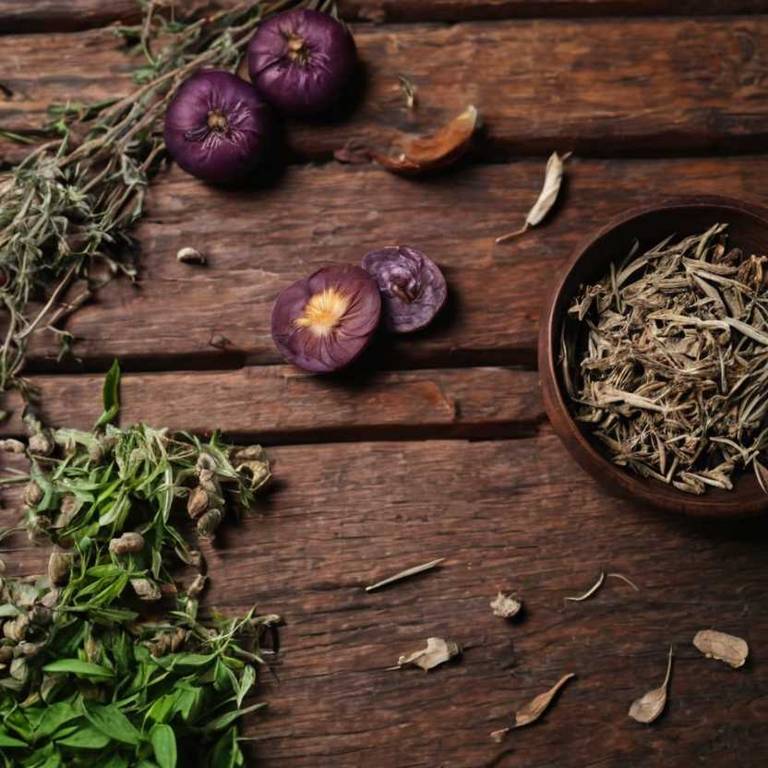Japanese Plum (Prunus mume)
Japanese Plum (Prunus mume) is a member of the Rosaceae family, native to China, Korea, and Japan. Traditionally, its fruits, bark, and leaves have been used for decoctions, infusions, and poultices.
This herb is particularly valued for its anti-inflammatory, astringent, and tonic actions, and has a long history of use in traditional chinese medicine, japanese kampo medicine, and korean traditional medicine.

Quick Facts / Key Information
| Common Name | Japanese Plum |
|---|---|
| Scientific Name | Prunus mume |
| Plant Family | Rosaceae |
| Genus | Prunus |
| Species | mume |
| Native Range | China, Korea, Japan |
| Plant Parts Used | Fruits, Bark, Leaves |
| Primary Medicinal Actions | Anti-Inflammatory, Astringent, Tonic |
| Primary Traditional Systems | Traditional Chinese Medicine, Japanese Kampo Medicine, Korean Traditional Medicine |
| Historical Preparation Methods | Decoction, Infusion, Poultice |
Botanical Identity
- Scientific Name
- Prunus mume
- Common Name
- Japanese Plum
- Synonyms / Alternative Names
- Chinese Plum, Mume, Japanese Apricot
- Plant Family
- Rosaceae
- Genus
- Prunus
Botanical Description
- Growth Habit
- Perennial deciduous shrub.
- Height
- It typically grows to a height of 1 to 5 meters.
- Leaves
- Opposite, elliptic leaves with dark green upper surface and lighter green lower surface, bearing distinct stomatal bands along the midrib.
- Flowers
- Flowers are solitary, actinomorphic, with five pink to white petals, five sepals, and a yellow stamen cluster.
- Stems
- Elongated, erect growth habit, opposite branching pattern, smooth, glabrous surface, presence of thorn-like structures along the stem.
Traditional Uses / Historical Use
Traditional Systems
- Traditional Chinese Medicine
- Japanese Kampo Medicine
- Korean Traditional Medicine
Historical Preparation Methods
- Decoction
- Infusion
- Poultice
- Powder
Medicinal Actions
- Anti-inflammatory
- In herbal texts, considered a mild anti-inflammatory, in inflammation-focused discussions.
- Astringent
- Traditionally described as a cooling astringent, in tissue-toning contexts.
- Tonic
- Commonly referenced as a soothing tonic, in general wellness contexts.
- Carminative
- As described in traditional systems, a gentle carminative, within digestive system contexts.
Active Compounds
- Flavonoid
- Naturally occurring polyphenols that contribute to pigmentation and structural chemistry.
- Tannin
- Plant-derived compounds known for their ability to bind proteins.
- Phenolic Acid
- Organic acids commonly occurring as part of plant secondary metabolism.
- Coumarin
- Organic compounds biosynthesized as part of plant secondary metabolism.
Modern Research Overview
Scientific literature concerning this plant spans multiple areas, including phytochemistry and laboratory research. Detailed analysis of published studies is not included at this time and will be added as part of future editorial expansion.
Safety & Contraindications
- General Precautions
- General precautions have been noted regarding the use of this herb.
- Contraindications
- Available information does not clearly establish contraindications for the use of this herb.
- Allergies
- Sensitivity or allergy-related effects have not been clearly established.
- Drug Interactions
- Interactions with prescription medications have not been well documented.
- Toxicity
- There is insufficient evidence to determine the toxic potential of this herb.
- Pregnancy & Breastfeeding
- There is insufficient evidence to determine the safety of this herb during pregnancy or breastfeeding.
Preparation & Usage Methods
- Infusion
- Plant material is steeped in hot water to extract water-soluble compounds.
- Decoction
- A preparation method involving prolonged boiling of roots, bark, or dense plant material.
- Poultice
- Fresh or dried plant material is applied externally to the skin.
- Culinary Use
- This method integrates plant material into edible preparations.
- Extract
- This method isolates plant compounds using alternative solvents.
Growing, Harvesting & Storage
Growing / Cultivation
- Soil
- Prefers loamy soil with well-drained conditions. Typically grows best in organically rich soils.
- Sunlight
- Thrives in partial sun. Tolerates full sun to partial shade.
- Watering
- Prefers well-balanced moisture levels. Tolerates moderate moisture fluctuations.
Medical Disclaimer
The information provided on this page is for educational and informational purposes only. It is not intended to diagnose, treat, cure, or prevent any medical condition. Always consult a qualified healthcare professional before using any herb for medicinal purposes.